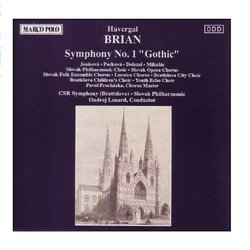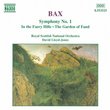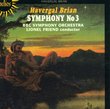| All Artists: Ondrej Lenard, Havergal Brian, Czecho-Slovak Radio Symphony Orchestra (Bratislava), Slovakia Philharmonic Orchestra, CSR Symphony Orchestra (Bratislava) Title: BRIAN: Symphony No. 1, 'Gothic' Members Wishing: 0 Total Copies: 0 Label: Marco-Polo Release Date: 9/9/2009 Genre: Classical Styles: Opera & Classical Vocal, Symphonies Number of Discs: 2 SwapaCD Credits: 2 UPC: 730099328029 |
Search - Ondrej Lenard, Havergal Brian, Czecho-Slovak Radio Symphony Orchestra (Bratislava) :: BRIAN: Symphony No. 1, 'Gothic'
 | Ondrej Lenard, Havergal Brian, Czecho-Slovak Radio Symphony Orchestra (Bratislava) BRIAN: Symphony No. 1, 'Gothic' Genre: Classical
BRIAN: Symphony No. 1, 'Gothic' by Ondrej Lenard |
Larger Image |
CD DetailsSynopsis
Album Description BRIAN: Symphony No. 1, 'Gothic' by Ondrej Lenard Similar CDsSimilarly Requested CDs
|
CD ReviewsBrain is Unlike Anything Else Christopher Forbes | Brooklyn,, NY | 01/18/2003 (5 out of 5 stars) "Havergal Brain, if he is remembered at all, is remembered as the composer of the longest symphony in the Guinness Book. The Gothic Symphony is gargantuan, and in many ways not at all typical of Brain's mature output. But it is remarkable nonetheless and completely without precedent. Scored for extremely large orchestra and chorus, the Gothic suffers from two things, one is a comparison to Mahler, particularly the Mahler 8th. This comparison is unfair to both composers as the works are really apples and oranges. Those expecting another Symphony of a Thousand are always disappointed by Brain. The second drawback for Brian is the sheer size of the work, which has given rise to a myth that it is unplayable. Difficult it is, and I can imagine that it's choral tone clusters were a great challenge to it's opening night British choir, but with all of the modern advances in choral and orchestral technique, I'm not sure that Brian is such a task anymore. But somehow, these two myths help keep the work from commanding the concert hall stage. It's a real shame, because the work is unlike anything else. The Gothic is set in two gigantic parts. The first part is for orchestra alone and could almost be a symphony in itself. It contains what sound like all four movements of the traditional symphony but tightly compacted. Brain was a fecund composer, sometimes to his detriment, and the ideas flow fast and furious, often without obvious relationship. But a close listening will reveal subtle thematic connections between much of the bewildering variety of themes in the work. For all the works oddity though, the musical language is never much more harsh than, say, Elgar. The challenge of listening to Brain here is not in the dissonance of the work, which is quite mild in the first part, but in the unusual approach to themeatic development and structure. Nothing is ever predictable in this work. If Brian had stopped at the end of the first part of his symphony he would have created a respectible, if quirky symphony in the English progressivist tradition. But he pushed on. The second part of the symphony dwarfs the first completely. Brain sets the Latin text for the Te Deumj for a monstrous choral group with soloists and orchestra. All the stops are let out in this movement. Nearly medieval choral writing is contrasted with violent orchestral outbursts. There are even moments of dense tone clusters that predate Ligeti by 50 years. The experience is like that of a Gothic Cathedral, everything is included, the sublime, the terrifying and even the grotesque. After more than 20 listens I still can't tell whether I truly love the work, but it is definately unlike anything else ever written and should be better known. The performance is probably the best that you can expect in the circumstances. Marco Polo is a division of Naxos, but one that has always disappointed me, even as they have cornered the market on obscure composers such as Brian. Marco Polo doesn't seem to attract the same quality of performers that Naxos proper does and it doesn't have the attractive price to compensate. The performance on this disc is respectable, but at times a little sloppy. Add to that the rather poor sound quality and it leaves alot to be desired. Brian's masterpiece deserves better. Hopefully someone else will try to tackle this work, but in the meantime, this disc is the only game in town, so you should get it and experience this early 20th century monument for yourself." Havergal's Brian early magnum opus...a masterpiece Brian M. Kulesza | Joliet, Illinois | 04/11/2004 (5 out of 5 stars) "Mahler's Third Symphony or Schoenberg's "Gurre-Lieder" are two works that come to mind when trying to present novices with repertory pieces with which to compare Havergal Brian's Gothic Symphony.This may be a truism, but in growing to appreciate this masterful work, one must come to terms with its mammoth proportions.The composer offers a three-movement symphonic suite and fuses to it a three-movement Te Deum that is rather syncretistic in nature. Secular moves freely into sacred, the high art of Church Music then proceeds to the "low" art of sea songs, shifting throughout a backdrop of quietude alternating with dense polyphony.Some themes (such as the sea song in the last movement) recur. Other themes, some of which can only be described as glorious, appear only once, fleeting and ephemeral.The third movement offers a noteworthy passage in which a piccolo and bass oboe take up a theme "out of the blue" and then follow it with a xylophone cadenza (!!)(absolutely remarkable).The sheer number of performers (see the liner notes for details)create overwhelming financial and logistical challenges that will forever disqualify this great work of art from becoming "standard repertoire." However, I could see that there is a place for it in, say, festival settings.The symphony's length is not terribly daunting if one compares it to the Mahler symphonies or a night at the opera for a performance of Wagner's "Parsifal" or Messiaen's "St Francis of Assisi."Purchasing this set and listening to all that this work has to offer is an excellent way not only to spend money, but also to learn about the cavernous musical territory that Havergal Brian charted. I hope you will take a chance on it." Bigger than big R. Lieblich | Arlington, VA USA | 05/09/2007 (4 out of 5 stars) "If ambitiousness alone were the test, this would rank with the greatest pieces of music ever composed. In both time scale and forces used, this ranks with anything by Mahler, and it is even more diverse in its materials than such Mahler potpourris as his Third Symphony. But there are two major caveats for anyone thinking of purchasing this set of CDs: (1) The symphony itself is uneven, and (2) So is the performance. The latter is no slur on the performers, who are clearly knocking themselves out to do a good job. The sheer difficulty of the music simply stretches them further than at times they are capable of going. And while the music itself, at best, is truly inspired, even occasionally magnificent, it's not always at its best. There are some real yawners among the sections of the Te Deum, and the scherzo overstays its welcome. The sound itself is pretty good, but the fortissimos just won't fit on a CD, so things get a bit blurry at times.
If, however, you love large choral-orchestral works by the likes of Berlioz, Liszt and Mahler, and if you are sympathetic to some of the lesser-known but highly capable 20th Century symphonists like, say, Tubin, Holmboe, and Rubbra, you ought to explore this. At the low price (remember, it's two CDs), you can't go very far wrong, and you might wind up a devoted admirer of this Gargantua, warts and all. I did." |

 Track Listings (25) - Disc #1
Track Listings (25) - Disc #1








